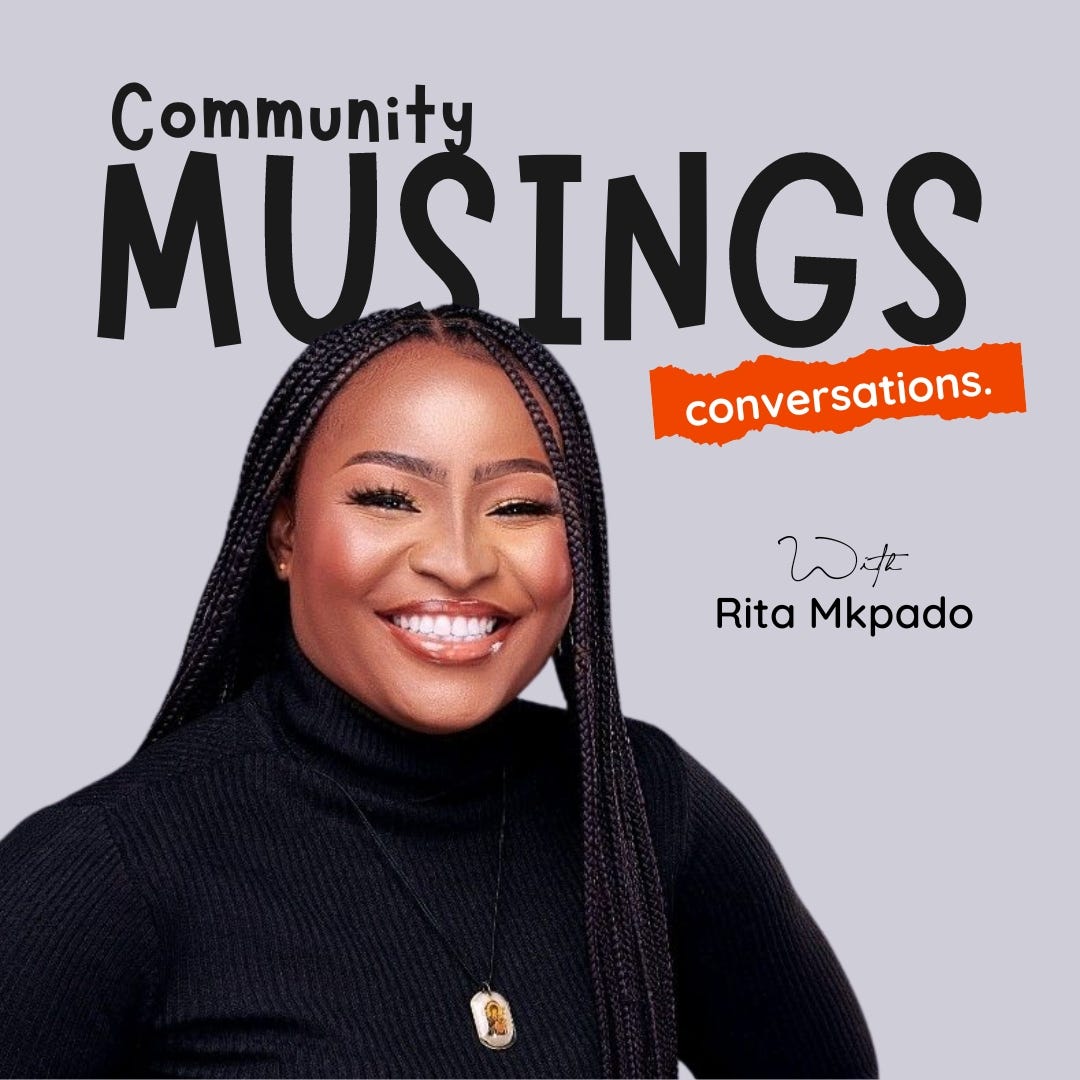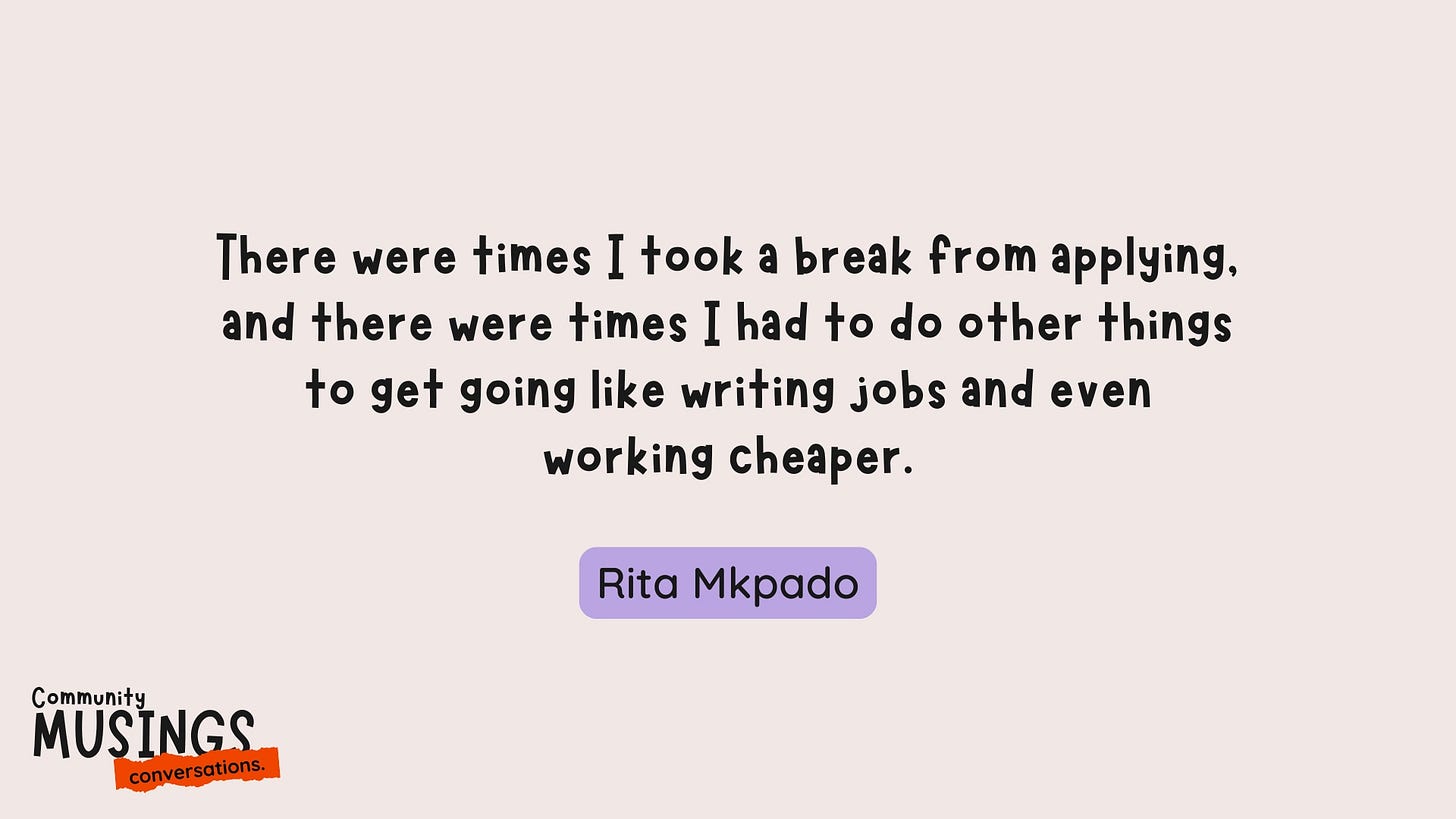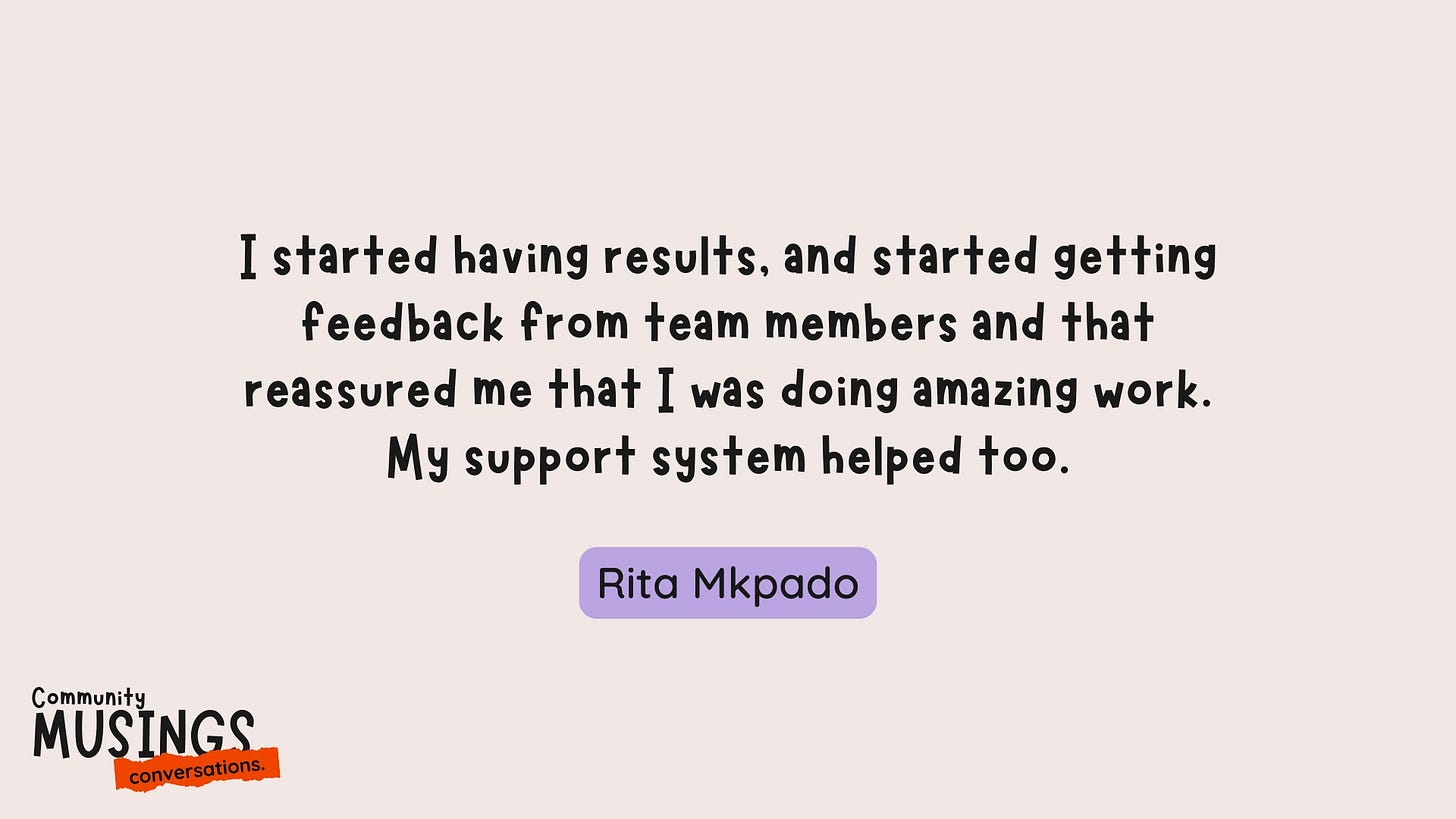Your Sign to Unplug and Take a Break
Musings with Rita Mkpado, VP of Community at Hive3
Behind every thriving community is a a human with emotions and things to deal with. This is Community Musings: Conversations. — a series dedicated to navigating the mental and emotional rollercoaster of building a career in community.
Meet Rita Mkpado!
Rita is one amazing African Community Manager killing it in the Web3 space. I had the pleasure of connecting with her while exploring that space and she has been a big supporter of this newsletter. She formerly led the Community at Third Academy and is currently the VP of Community at Hive3, where she continues to make significant strides in building Web3 communities.
Here is her story!
Martha: What is your "I stumbled into community management" story? 😄
Rita: My journey into community management started when I got involved in the Web3 Space. Honestly, before then I never heard of the term “Community Management”, I didn't know it was a thing much less a professional career path. So, when I came into the space I knew I wanted to be here for a long time because of the opportunities to build the future that I want for myself with the help of God.
I started with being a moderator and saw how things were been done from behind the scenes. I knew that just moderating was not going to cut it, so I took courses; community management, marketing, social media and the different parts that interplay with building communities, and how they help in building relationships. I'm so glad that I stumbled into it. It's been a great journey from then so far.
Martha: In seasons of searching for a job or jobs, how did you maintain your professional identity and navigate the negative feelings that popped up? Did you ever feel like switching careers?
Rita: The season of job searching comes with its rollercoaster. For me it’s been one of the most stressful and exhausting. It definitely brought negative feelings along the way but I don’t think there was ever a time I considered changing my career. I knew that community management was what I want to do. I couldn’t think of any career path I’d want to consider, so I just continued in the search believing that someday it would come.
There were times I took a break from applying, and there were times I had to do other things to get going & get an income to support my family, like writing jobs or even working cheaper. Many times I got interviews, but then my hope got dashed, yet I picked myself up and kept moving.
It takes time, and I know everything good in life takes time. Sometimes self positive talks help me to move forward too.
Martha: Our role can often blur the lines between work and personal life. What boundaries do you have in place to protect your mental health while still delivering great results? How do you maintain a healthy work-life balance?
Rita: Hmm… work-life balance. Your question already highlights the point that our work sometimes blurs the line between personal life and work. Of course, there’s a need to have those boundaries in place because of your mental health and your health all round; your physical health as well because sometimes staying up at night working can impact your physical health.
So, for me, one of the ways that I try to maintain a work-life balance is that I clock out of work on weekends. If you ask me for work-related stuff on weekends, I’m not available for it. I spend that time effectively with my family, and friends, and catch up with other things.
Another thing is to make sure that I’m not working till 11pm or 12am because I did that a lot at the start of my career; I wake up in the morning, start working, and at 11pm I’m still working because of course there’s always something to do. What I do now is I plan my week by making a list of everything I need to do based on our weekly team meeting; I write them based on their priority. I work on my tasks and I make sure that they fit into their schedule so that I’m not trying to do everything for the week in one day.
Thirdly, in my calendar when I have very important tasks to do that involve reading, research, writing, or anything I consider very important at that time, I block out my calendar so I’m completely focused with no distractions. I don’t want team members fixing a meeting at a time when I want to focus on getting my task done.
Martha: Everyone struggles with feelings of self-doubt once in many times 😅 What’s your experience with imposter syndrome and how do you overcome it?
Rita: Imposter syndrome! Hehehe! I’ve had my fair share for sure! I think it was at one time last year, that I had gotten this role. I was at a point where I was asked to do much more than I had ever done as an up-and-coming community manager; more roles, and more responsibilities. Of course, imposter syndrome showed its face and was like “Do you think you’ve gotten to this place? They are all deceived by the small work you’ve done”.
It was a great struggle for me because that was one of the times when I fell ill because I was trying to please everybody, so I went overboard. I would wake up at 8am and work late till about midnight, I was barely sleeping, I was just trying so much to prove that I was capable of what was handed to me. That self-doubt kept coming at different times that I had not gotten to the level I was at, that I couldn’t do it. I would read meaning to everything someone was doing; if I did a task and there was no immediate feedback, I would worry that I’ve done a non-commendable task and they will finally know that I’m a fraud.
What helped me to deal with it was when I started having results, and started getting feedback from team members. That reassured me that I was doing amazing work. I started becoming proud of myself and my support system outside of work helped me too.
Martha: Lastly, can you share a tip that always works for you whenever you are faced with any challenge in managing communities- whether that is with strategy, engagement, or growth- that one thing that sets you in the right direction?
Rita: It’s talking! For instance, if I’m struggling with engagement, one thing I do is talk with the members of the community; to know why they are not engaging and what they’d love to see. Working with these feedbacks and experimenting is key!
If it’s about growth, I talk with people whose community is doing so well in terms of growth. I talk to different sets of people to learn from their experiences and find ways to tweak their approach to fit the community that I manage. So if I’m working with what I know, and it’s not working, and I’m having a challenge, I find ways to talk with people who those things are working for to learn from their experience.
Another thing is this; I go back to my books; courses I’ve taken in the past, lessons I’ve written in the past, and just refresh my memory. I also look back on newsletters or articles I’ve come across and saved in the past.
Connect with Rita Mkpado on LinkedIn and X
—
*Editor’s note: This interview has been edited for clarity and length.
- Enjoyed this piece?
- Did something stand out to you?
- Yet to subscribe?






Lovely read. Thank you!